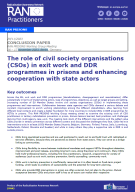Details
- Publication date
- 1 July 2024
- Author
- Directorate-General for Migration and Home Affairs
- Country
- Germany
- RAN Publications Topic
- Prison and probation
Description
Across the EU, exit work and DDR programmes (deradicalisation, disengagement and resocialisation) differ substantially in terms of implementing actors, type of programmes, objectives, as well as target groups and setting. Increasing number of EU Member States involve civil society organisations (CSOs) in implementing these programmes and interventions.
Collaboration between state agencies and CSOs demand a serious debate and constant improvement to enrich working relationships among the different stakeholders, allow learning from different local contexts and create a better foundation for more countries to include CSOs in DDR programmes for VETOs in prisons. This RAN PRISONS Working Group meeting aimed to examine the existing work of CSO practitioners in tertiary radicalisation prevention in prison, discuss lessons learned, best practices, and challenges deriving from multi-agency case work.
The meeting took stock of the different interventions and the added value CSOs provide in tertiary prevention across different context and discussed the challenges they face. CSOs-led exit interventions exist in at least 10 EU Member States (Austria, Belgium, Germany, Finland, France, Italy, Luxemburg, Netherlands, Poland, Slovakia and Sweden) and while in many others they play a supportive role in DDR in and outside prisons.
- CSOs bring specialised expertise and are well positioned to reach out to and build trust with radicalised or terrorist offenders, because they are perceived as distinct from state actors. They can serve as a bridge linking to communities.
- CSOs bring flexibility to move between institutional mandates and support VETOs throughout detention, imprisonment and post-release, providing long-term care, along the prison-exit continuum. Many CSOs hold multi-professional teams, including first line practitioners, research, programmes for variety of audiences (such as exit work, tertiary prevention, family counselling, community work.
- CSOs work in tertiary prevention is insufficiently resourced as it is often based on fixed-term project funding, which leads to problems of sustainability and the potential for long-term planning.
- CSOs who provide DDR interventions in prison are often external, but not alien to the prison. mandates. Communication is needed to approximate different perspectives, approaches and priorities of CSO and state actors involved in DDR in prison. Case conferences remain one of the most useful methods.
- Confidentiality vs security needs continue to be a point of tension between CSOs and security actors. A strong rapport and full transparency with the inmate on what information CSOs are obliged to share is useful – the client might (partially) wave their confidentiality right if they sense it will help them.
- Trust is a two-way street; it is built via recurring interactions between different actors. Useful practices are work shadowing, ‘doing the rounds’ together, introduction sessions of CSOs to a new prison (and addressing mutual biases from the beginning of the relationship), mutual feedback rounds, joint trainings and team building, conducting interviews with inmates jointly, having a point of contact from each actor, as well as good structure for documentation.

